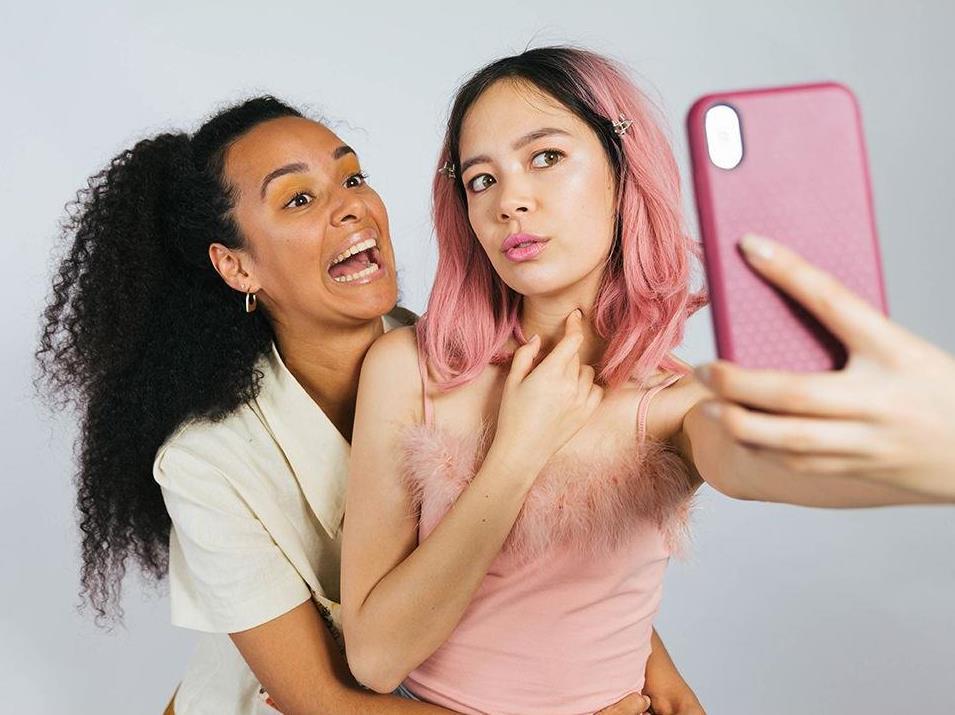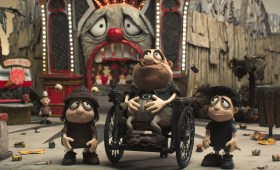Matheson, left, and Nicdao, right, as primo millenials Daisy and Lucy. Image via ABC.
I’m watching a pink-haired girl take selfies on her phone. She adjusts her posture and expression lighting, regularly, sighing and pouting when the shot doesn’t come out right. I get it; we’ve all been there. The difference here is, I’m watching her through her phone screen. It feels like a transgression; am I allowed to be here?
Content is a comedy coming-of age series made by the ABC for a vertical format; that is, while you can watch it on iView on a computer or TV, it’s designed to be watched on a mobile. In short, Content is a show with terrible SEO and an excellent premise: the entire show is viewed as if via screenshare, through Lucy’s use of her phone.
This isn’t ABC iView’s first foray into fictional vlogging. Sarah’s Channel, which premiered in June 2019, follows a fictional beauty vlogger making videos (and her own makeup products) after the zombie apocalypse. Content is more grounded in reality, and capitalises on the increasingly intimate relationship people have with their phones to deliver a classic coming-of-age story in a fascinating format.
Through her screen, viewers spectate as Lucy Facetimes her housemate Daisy, scrolls through Facebook, and, towards the end of the first episode, crashes her car while doing a Facebook Live, catapulting her to brief internet fame. Lucy is aglow at this success, and in episode two, tries to capitalise on her viral success with further livestreams, to the (impending, but obvious) detriment of her IRL relationships.
Charlotte Nicdao and Gemma Bird Matheson both shine in their leading roles as star-crossed millennial best friends, doing their best to get through various degrees of chaos. It certainly has people talking; despite being clearly presented as fiction, the acting and writing is strong enough to mean that clips from the show had some people fooled.
I watched Content on my phone, as iView suggests, and see my own notifications from Gmail and Messenger overlapping with Lucy’s. The format is undeniably immersive; I will admit I feel a moment of panic when she made a FaceTime call in episode one, half-expecting my own face to appear on-screen when the call is answered.
It’s a testament to strong writing that the show is yet to have its first ‘old people trying to write about the internet’ moment of cringe; Daisy and Lucy’s texts feel genuine. That said, the tone overall feels judgemental, and a little removed; Lucy blatantly ignores things her best friend tells her, or demands financial and emotional support with no expectation of ever returning it. She is held up as the ultimate millennial joke; all pink hair, privilege, neuroses and unearned ego. A viewer would be forgiven for falling into the trap of believing that all her problems (unemployment, lack of direction, loneliness) would be solved if she just got off that phone.
It’s a judgement as old as time, and frankly, knowing that youth unemployment rates in Australia are sitting at 12.9%, it’s a little tedious. I understand that the key demographics that constitute the ABC’s audience are probably not avid TikTok users, but it’s disappointing to see such an interesting format wasted on a condescending sentiment.
The show has also packed a lot into its first three episodes, which are 11,16, and 12 minutes long, respectively. While this might seem like a positive, it somewhat misses the point of the medium. Lucy’s phone use, as seen through the viewer’s eyes, is constantly directed; she rarely takes an action that doesn’t contribute to the narrative. Ironically, this seems to undercut the point of the show and its format.
Ultimately, Content’s need to make sure everything is obvious by keeping the action strictly chronological, and underlining the fact that Lucy is self-absorbed, Daisy is long-suffering, and nothing is uncertain, ultimately feels hollow. When the narrative is at its most curated and clear, it makes the use of an intimate format feel less personal than it does gimmicky.
Episode three even breaks from its constraints, including spoken dialogue between Daisy and Lucy as they swipe their way through Daisy’s Tinder. There’s the nominal excuse that Daisy has left a recording app open in the background – but at the end of the day, it feels like a decision made by a creative team who are already feeling a bit sick of the show’s main point of difference. My concern is that the show will treat its social media focus less as a way to explore the intimacy and anxiety of growing up, and more superficially, just as, well, content.
The most promising moments so far for me are when relaxes its grip in the narrative, and capitalises on the appeal of an actual livestream: the sense of being given access to a stranger, who is living their own complete life. A highlight for me was when Lucy gives up on her spicy noodle mukbang and leaves the camera running, and the viewer watches one lonely guy in the chat commenting incessantly on the elegance of her housemate, who is eating dinner in the blurry distance, unaware she is being surveilled.
With a format as interesting as this, and cast and writing team who are clearly engaged with their material, I really hope the show gets brave enough to bore me a little more.
| 3.5 stars |
★★★☆
|
Content is available to watch here on ABC iView.
Actors:
Director:
Format:
Country:
Release:





